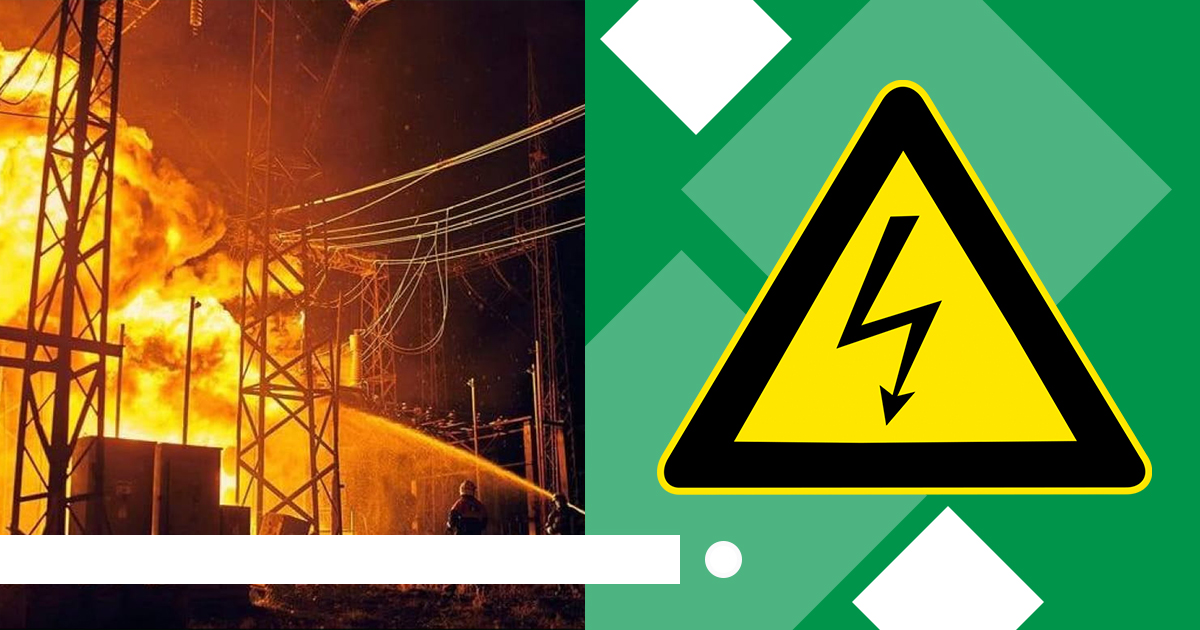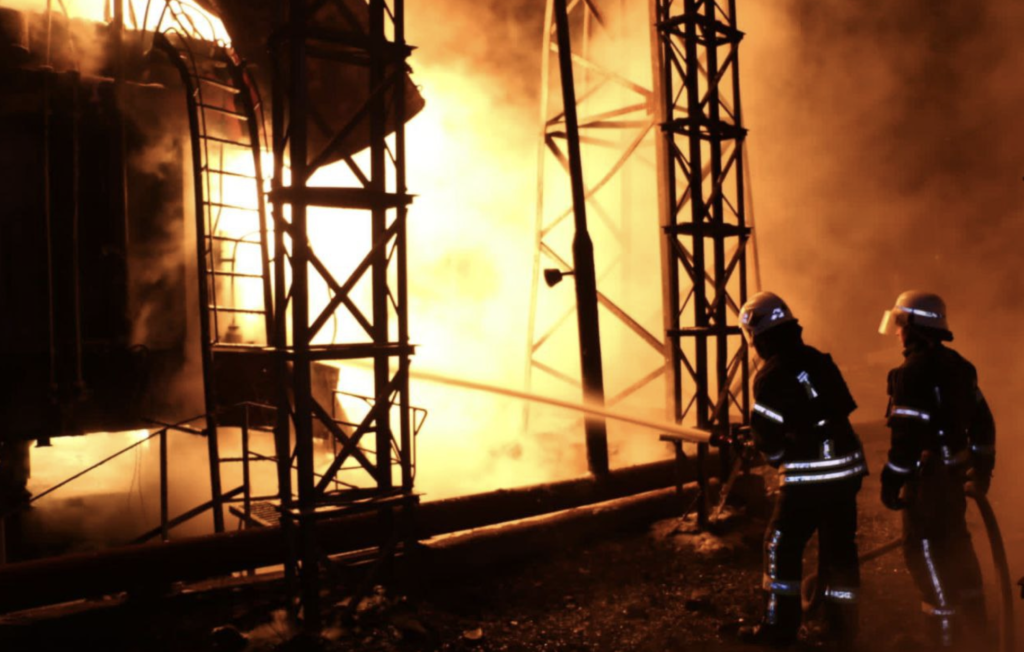A recent missile attack on the Kharkiv thermal power plant # 5 the other day led to a mass blackout of populated areas in the Kharkiv, Donetsk, Sumy, Poltava, and Dnipropetrovsk regions. Today, services were able to restore electricity supply in almost all regions. But Ukrainians wondered why this happened and how to protect themselves from life without electricity.


The events of the evening of September 11 demonstrate the vulnerability of Ukraine's energy system today. Why did the rockets hitting two energy facilities in Kharkiv and Kremenchuk cause fan outages in several regions and water problems?
Maksym Babaiev, a renewable energy expert and coordinator of the Ukrainian Climate Network (UCN), analyzed:
"The first fact we must remember is that Ukraine has a so-called unified energy system. This makes it possible to manage the electricity supply throughout the country effectively. But it also creates serious risks because, as we have seen, the failure of several important objects can disrupt its operation," Babaiev explains. "The second fact: in a modern energy system, energy production must always be equal to its consumption. That is, if the generation at power plants is sharply reduced, then people and enterprises must also reduce consumption simultaneously."


These two facts worked on the evening of September 11. The shelling disabled two critical generating facilities and the system operator had two ways to solve the problem. He had to instantly find additional power plant capacity, which is nearly impossible given the old coal-fired units and hydroelectric plants we have at our disposal now, or sharply limit consumption in a large area. It means massively cutting off electricity in several regions. Here is the first fan shutdown people have already talked about so much.
Everything was restored in a few hours, thanks to the heroic actions of the energy workers, two of whom died. But let's imagine that the damage turned out to be more severe, that repairs need not hours but days.
After all, electricity primarily means access to critical services—communication, coordination, lighting, water and heat supply, food storage, etc. These services cannot be underestimated, especially in remote, rural areas. In a civilized society, they should always be provided, at least in a limited form.
So, the overall network can be disabled. What should people, communities, and enterprises do in this case? What backup power supply options should we consider?
The heating season is fast approaching, and the enemy will use this to influence us. Communities must also prepare by implementing the available solutions because people's health and well-being are paramount. Therefore, it is clear that many of us will be struggling with what is currently available this winter. If you have the opportunity to increase the independent energy supply of yourself or your community, don't hesitate.
Diesel or gasoline generators, boilers, solid fuel boilers, and mobile thermal power plants can be temporary solutions for the near future. But, Maksym Babaiev assures that the only acceptable strategy is the development of local energy capacities with a constantly available reserve.
"Solar and wind farms on private homes, important utilities, and enterprises with energy storage systems have become very popular since the beginning of the full-scale invasion. For example, a solar station (SPS) of 4-5 kW with a battery will give the average household enough electricity for lighting, charging gadgets, heating, and water supply most days of the year," the expert suggests.
For example, several families had electricity in the village of Yasnohorodka in the Kyiv region during the occupation, thanks to a 10 kW SPS. "I decided to rework the home SPS on the fly and quickly create an 'energy island.' For this, I had to solve two key issues: to construct direct charging of batteries from solar panels and AC-coupling so that a large field of panels connected to network inverters doesn't sit around," Oleksii Khabatiuk shared with his colleagues from the community of solar station owners.
Babaiev adds that Ukrainian companies already offer inexpensive mobile (portable) systems that can provide several households or administrative buildings with electricity from the sun. You can easily transport such solar stations to different locations depending on the need.
"SPPs in administrative buildings in villages will enable locals to charge their phones, communicate with relatives and access the Internet, and charge lighting devices. When there is no emergency, they provide the electricity needs of these institutions," Babaiev notes.
Voznesensk of the Mykolaiv region and Baranivka are two examples of communities that, before the start of a full-scale war, installed a solar station with the financial support of Ecoclub. In August 2020, a 50 kW solar power plant was implemented at the Voznesensk Water Supply utility. This saved money and also allowed them to reduce greenhouse gas emissions. And the Baranivka community in the Zhytomyr region installed a 10 kW solar plant for an inter-school resource center.
For enterprises, the actual production of energy from the sun and wind is a way to reduce the cost of electricity and, therefore, to reduce the cost of production and, accordingly, reduce prices for it for the end consumer. However, entrepreneurs from cities where the power grid is constantly destroyed by shelling (for example, Kharkiv) are forced to provide themselves with electricity without the right to choose.
Rural communities can look to biomass boilers with organized supply chains for local fuels such as agricultural waste. Local businesses should be created to produce solid biofuels for institutions and private homes, which are additional jobs.
Cities with a large amount of household waste should implement biogas plants that will provide heat to local social facilities, generate electricity consumed by the local community, or biogas that can be used as fuel for heating and transport.
Natalia Lytvyn, the coordinator of the Energy Transition coalition, emphasizes the following advantages of energy production:
"Taking into account the modern challenges caused by the war, the Ukrainian energy industry needs transformation: getting rid of dependence on energy carriers from other countries, increasing the flexibility of the system, strengthening energy security, where renewable energy plays an important role," Natalia Lytvyn emphasizes. It requires state planning for years ahead. At the same time, communities (local self-government bodies) must be involved in developing such measures and in the energy transition itself.
If the demand for renewable sources and similar technologies increases, it will contribute to developing microgrids that unite different participants locally within the community. Consultations on how the community can start this process are provided, in particular, by experts from the Energy Transition coalition. You can turn to them for help.
The Ukrainian Climate Network advises Ukrainians and communities for the long term to prepare the ground for implementing renewable energy projects. Study technologies, audit available space, and resources, and communicate with businesses and institutions that support such projects. The country's energy independence should be based on the energy independence of every citizen.
39 років тому аварія на Чорнобильській АЕС призвела до відселення людей із територій, забруднених радіоактивними… Читати більше
Recovery Camp is a psychosocial rehabilitation project for Ukrainian children that has been running for… Читати більше
Екологічна освіта, громадянська наука та цікава практика — складники ініціативи, яку втілили для молоді Краснокутської… Читати більше
A team of researchers has trained an AI model to see not just rubble in… Читати більше
У лікарнях Харкова та Ужгорода студенти під наставництвом психологинь, менторів та супервізора проводять для дітей… Читати більше
У Лубнах фахівці, які допомагають військовим, вчилися будувати довірливий контакт із тваринами, зокрема кіньми та… Читати більше
Цей сайт використовує Cookies.